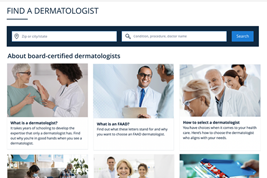Skin care for developing countries
The Academy offers grants to individuals and organizations to fund international volunteer and humanitarian projects under the Skin Care for Developing Countries program.
Grants available
Grants vary between $2,500 and $5,000 depending on the proposal, scope of the project, and availability of funds.
Application timeline
To be considered for the grant, applications should be submitted by June 30, 2026. Grant recipients will be notified by the end of 2026, so they can plan for funding and programming. Applications received after June 30 will be considered for the next year’s funding cycle.
For more information, contact RIGNAHS@aad.org.
Support the Academy’s strategic framework.
Related to dermatology and global health care, and help underserved regions of the world.
Sustainable, community-based, and rely on additional sources of funding. All funding sources must be detailed in your application.
Demonstrate how the project would be monitored and evaluated.
Submitted online (no emails).
Non-AAD members: application must include a letter of support from an AAD member.
Residents: application must include a letter of support from your institution’s faculty director to ensure sustainability after residency.
Please view the Grant Manual regarding all application requirements (PDF).
View a PDF of the past recipients of the grant.
 Find a Dermatologist
Find a Dermatologist
 Member directory
Member directory
 AAD Learning Center
AAD Learning Center
 2026 AAD Annual Meeting
2026 AAD Annual Meeting
 Need coding help?
Need coding help?
 Reduce burdens
Reduce burdens
 Clinical guidelines
Clinical guidelines
 Why use AAD measures?
Why use AAD measures?
 Latest news
Latest news
 New insights
New insights
 Physician wellness
Physician wellness
 Joining or selling a practice?
Joining or selling a practice?
 Promote the specialty
Promote the specialty
 Advocacy priorities
Advocacy priorities
